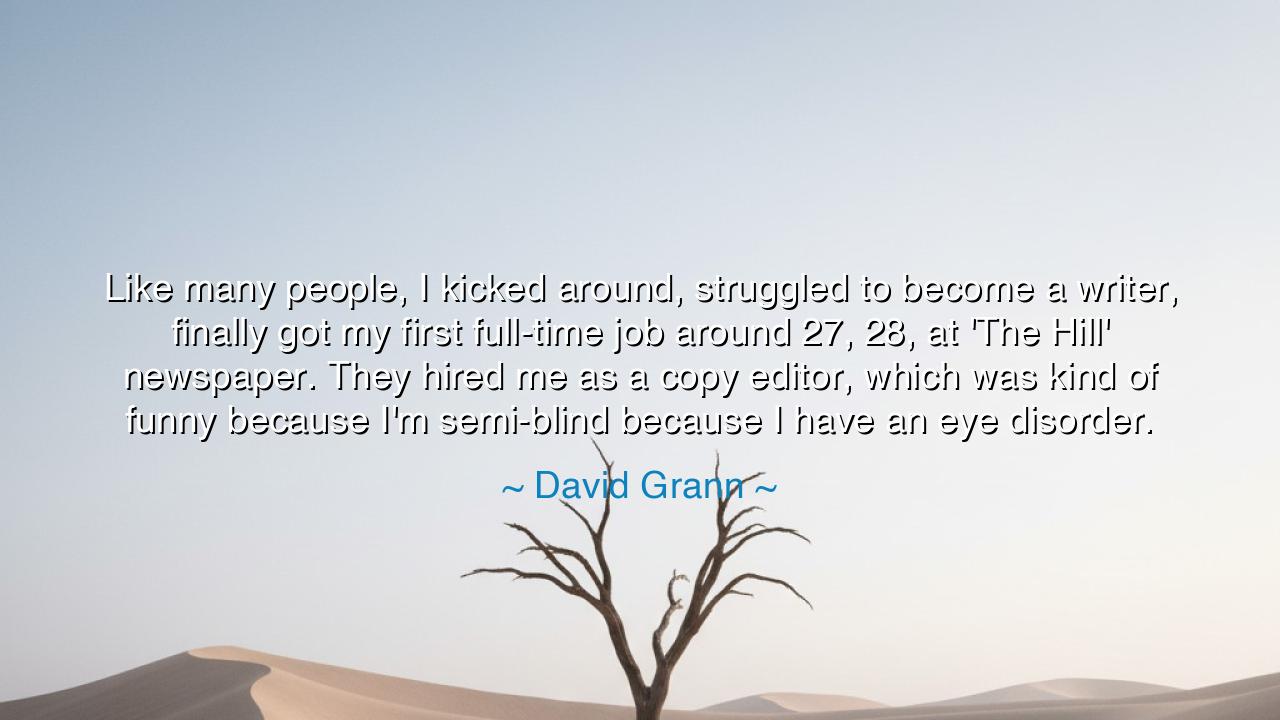
Like many people, I kicked around, struggled to become a writer
Like many people, I kicked around, struggled to become a writer, finally got my first full-time job around 27, 28, at 'The Hill' newspaper. They hired me as a copy editor, which was kind of funny because I'm semi-blind because I have an eye disorder.






The words, “Like many people, I kicked around, struggled to become a writer, finally got my first full-time job around 27, 28, at The Hill newspaper. They hired me as a copy editor, which was kind of funny because I’m semi-blind because I have an eye disorder,” come from David Grann, the acclaimed journalist and author whose works, like Killers of the Flower Moon and The Lost City of Z, blend rigorous truth with timeless storytelling. In this humble recollection, Grann offers more than a glimpse into his beginnings—he reveals a truth about perseverance, irony, and destiny. His words speak to the struggle of creation, the humor hidden in hardship, and the strength that grows when one continues forward despite imperfection.
In the ancient spirit, this saying could be read as an ode to the unyielding journey of the seeker. Grann confesses that he, like so many, “kicked around”—wandering through uncertainty, unsure of his place in the world. Yet in that wandering lay his forging. For the ancients believed that no soul becomes great without first walking through confusion and trial. Odysseus, too, was lost upon the seas before he found his home; the sculptor must first strike the marble before beauty emerges. Grann’s path, with all its struggle, mirrors this eternal law—that greatness is not granted to the gifted alone, but to those who persist when the way is unclear.
The irony of his words—that he became a copy editor while being semi-blind—is not merely humor; it is symbolic truth. Life, in its mysterious wisdom, often assigns us roles that seem to mock our weaknesses, only to reveal our hidden strength. To the ordinary eye, a man with limited sight editing text might seem absurd. Yet Grann, in accepting this path, proved that vision does not come solely from the eyes. His was the vision of intellect, of patience, of curiosity—the inner sight that perceives meaning where others see only words. The ancients would call this the sight of the soul, the gift that allows one to see truth even in the midst of imperfection.
Consider the example of Homer, the blind poet of Greece. Though he saw nothing of the physical world, his mind painted epics that still echo across millennia. The man who could not see gave voice to the vision of humanity itself. Likewise, David Grann’s “semi-blindness” becomes not a hindrance but a metaphor—proof that true perception lies not in perfect eyes but in the clarity of the heart and mind. For often it is those who know their own limitations who learn to see most deeply. As Homer once saw beyond sight, so Grann, too, transformed his imperfection into mastery.
In his tale, there is also a profound humility—a reminder that success rarely begins in triumph. Grann’s first full-time job did not crown him with glory; it tested him. Yet he accepted it, imperfect as it seemed, and through it he found his calling. The ancients taught that every beginning, no matter how humble, carries the seed of greatness. The plowman who tills his first field in doubt may one day feed nations. The writer who edits words in silence may one day give voice to history itself. What matters is not the prestige of the task, but the courage to begin and to continue.
Grann’s reflection also carries a kind of laughter—the laughter of acceptance, the understanding that life’s ironies are not cruel, but instructive. To laugh at one’s hardship is to take back power from it; to see the humor in one’s struggle is to rise above despair. When he calls his situation “funny,” it is not mockery, but wisdom. For the wise know that humor and humility are siblings—that both require perspective. In that laughter is the sound of endurance, the lightness that keeps the soul from breaking under the weight of effort.
So, my child, take this teaching into your own heart: do not scorn the slow path, nor the tasks that seem beneath your dreams. Embrace the irony of your journey, for it is the mark of the divine at work. The obstacle before you may be the very forge that shapes your gift. If your eyes falter, let your spirit see; if your strength wavers, let your faith endure. Like David Grann, laugh gently at the strange turns of fate, for they are not accidents but lessons in disguise.
In the end, his story reminds us that imperfection is no barrier to destiny. What defines a person is not the flaw, but the will to rise despite it. Grann, the semi-blind copy editor, became one of the most respected storytellers of his age—not because the path was smooth, but because he walked it with humor, humility, and resolve. So, when your path seems ironic or your gift uncertain, remember his example: even limited sight can yield limitless vision, and even a humble beginning can lead to a history written in light.






AAdministratorAdministrator
Welcome, honored guests. Please leave a comment, we will respond soon